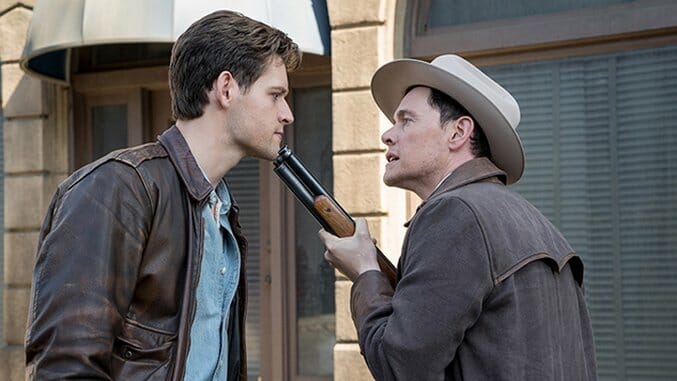The Man in the High Castle: “The Illustrated Woman”
(Episode 1.03)

When last we left Juliana Crain (Alexa Davalos), she’d just straight up killed a guy, using some of those martial arts skills she’s been learning in San Francisco. The irony, of course, is that the skills she’s adopted from an occupying power were used against an occupying power in order to make sure her mission continues. Of course, it’s been made clear so far in the series that the Japanese and the Nazis aren’t exactly on the best of terms, and that the Japanese are mostly just interested in maintaining the stability of their rule, while the Nazis aren’t hiding the fact that their definition of “peace” is one of total world hegemony, but regardless of what flag these occupying powers wave, they’re both after The Grasshopper Lies Heavy. Juliana has one (and so does all-American stud Joe Blake [Luke Kleintank], but she doesn’t know that), so she’s a popular vigilante nowadays.
After the seemingly resolute arc of The Man in the High Castle’s first two episodes, “The Illustrated Woman” expends much of its energy keeping the plot—any plot—moving, introducing a new villain and positioning ancillary characters for future machinations while Joe helps Juliana suppress her post-traumatic stress over the fact that she just ally-ooped some schmuck off the top of a dam.
Back in San Francisco, the Kempeitai release Frank (Rupert Evans), having just blithely informed him that, whoops, they couldn’t get to his sister and her children in time, so they’re dead. A few scenes following boil down Frank’s misery into some pretty straightforward mourning beats: First, he returns to his empty apartment, torn apart by the Kempeitai, to fall asleep on the floor with previously-heard dialogue dancing through his head; then, he must identify their bodies, but not before he’s told that because they’re enemies of the state (Jews), they won’t be given a proper burial; and third, he has to tell his brother-in-law (conveniently “away” on “business”) that he has no family to return home to. The way I relate these details makes it seem like there is much more concise, circular storytelling going on than there actually is.
Because—and maybe what I’m about to say isn’t all that fair—if these scenes were to have taken place in the midst of a “traditional” World War II/Holocaust film, they would almost definitely appear cliché, but within this alt-reality, they take on an unearned pall of grand humanistic melodrama. Frank may be dealing with the nebulous guilt tied to the fact that it was his girlfriend’s actions which indirectly led to his imprisonment and his family’s murders, but when Frank tells his brother-in-law about what’s happened, there’s nothing subcutaneously wrecking about their exchange at all. There is only workmanlike sadness, and obligatory emotional plotting.
Same goes with his coming home to a destroyed, empty apartment: tired, he flops down on the floor next to some pillows, and in case you haven’t been paying attention, the words uttered by Inspector Kido (Joel de la Fuente)—the person who told Frank that his sister has been killed—are repeated—the same words said at the end of the previous episode. It’s lazy writing, and lousy filmmaking—and it is as obligatory to endure as it is to describe. When Frank ends his arc of the episode by returning to his metal-working job just so he can build his own Colt .45, we don’t wonder what kind of tragedy the series will hold for him, we only vaguely care about how soon he’ll use it on a Japanese official so that he can fail and we can either move on past his rote storyline or get to the part when he becomes embroiled with the resistance.
-

-

-

-

-

-

-

-

-

-

-

-

-

-

-

-

-

-

-

-

-

-

-

-

-

-

-

-

-

-

-

-

-

-

-

-

-

-

-

-








































